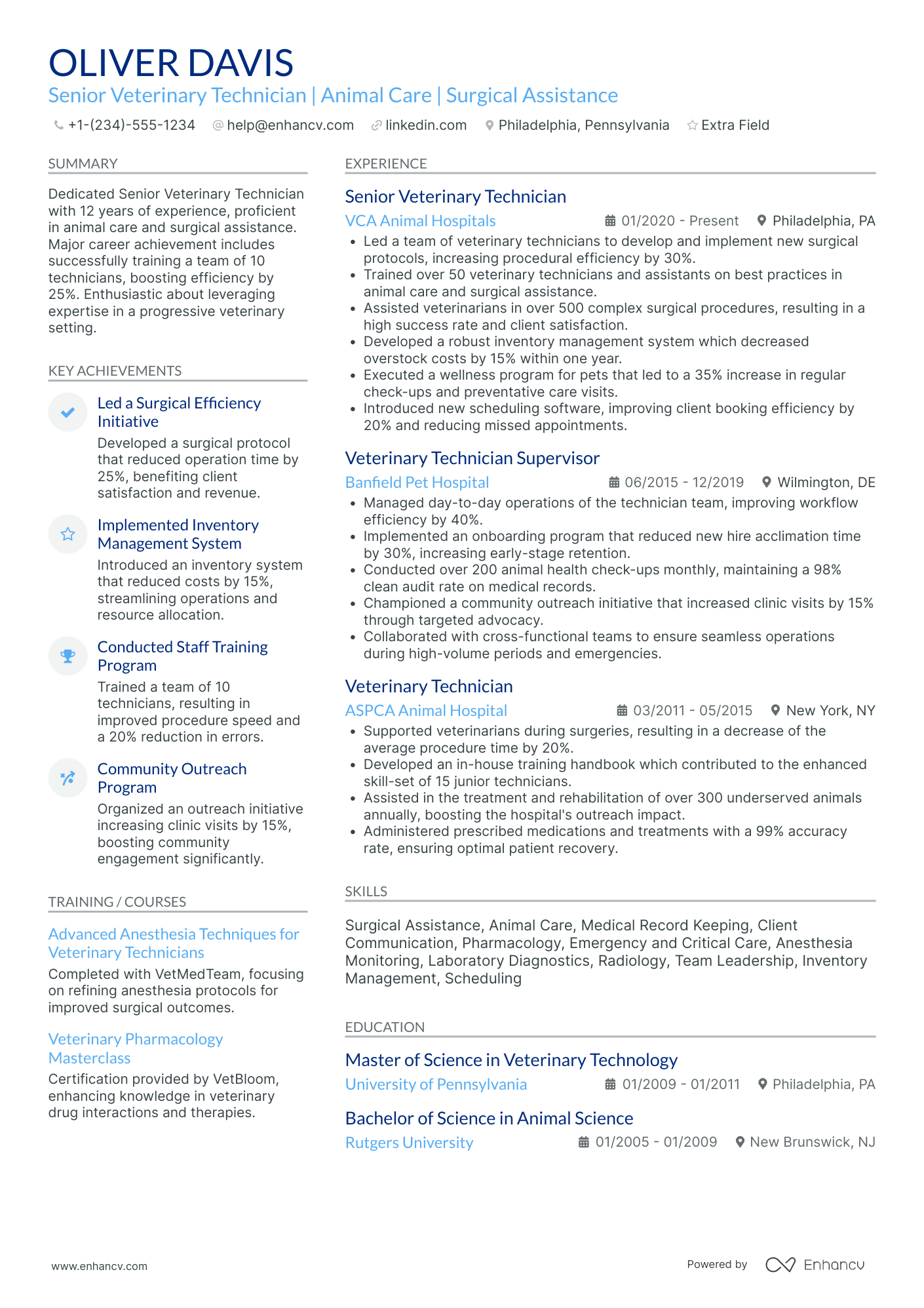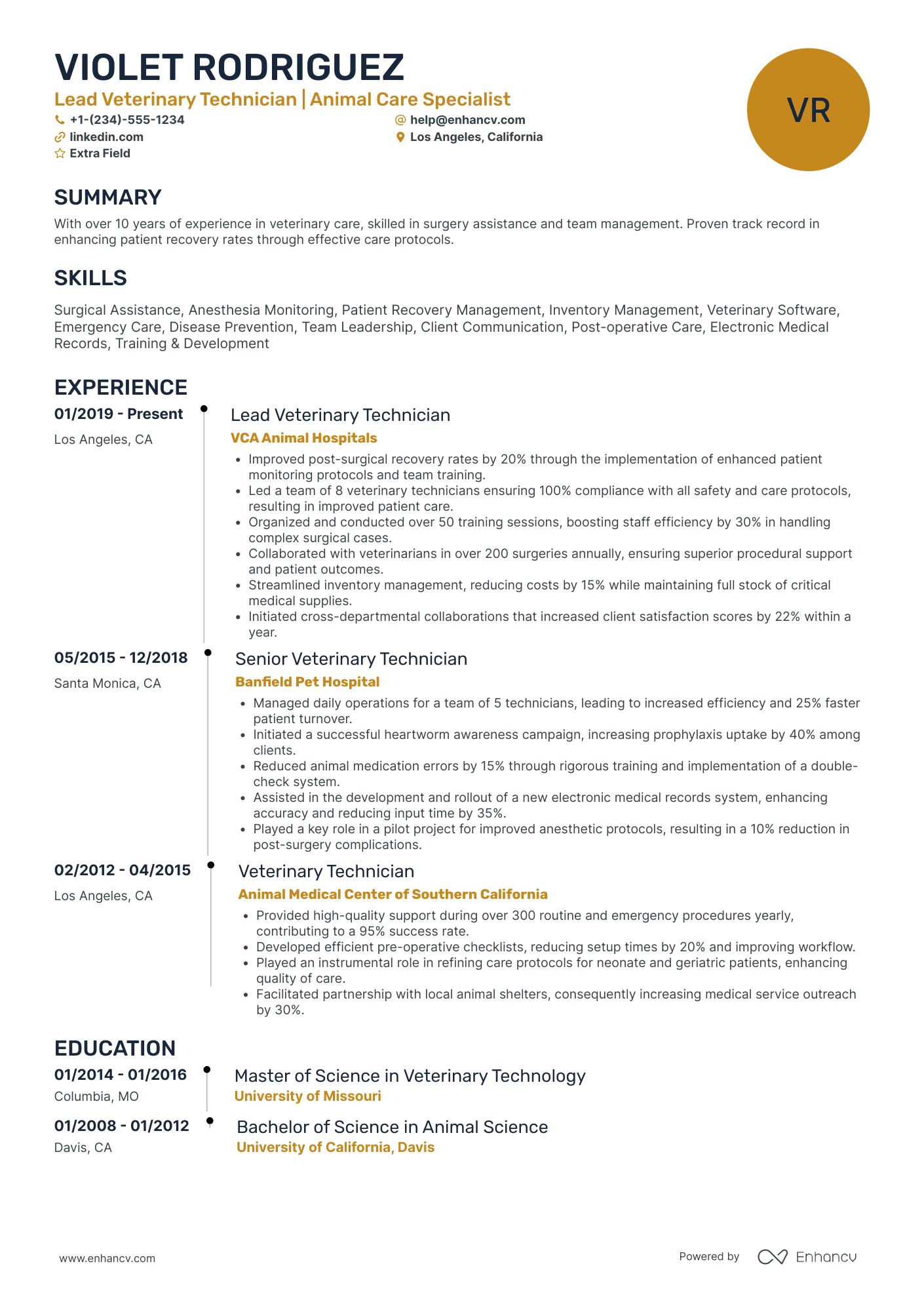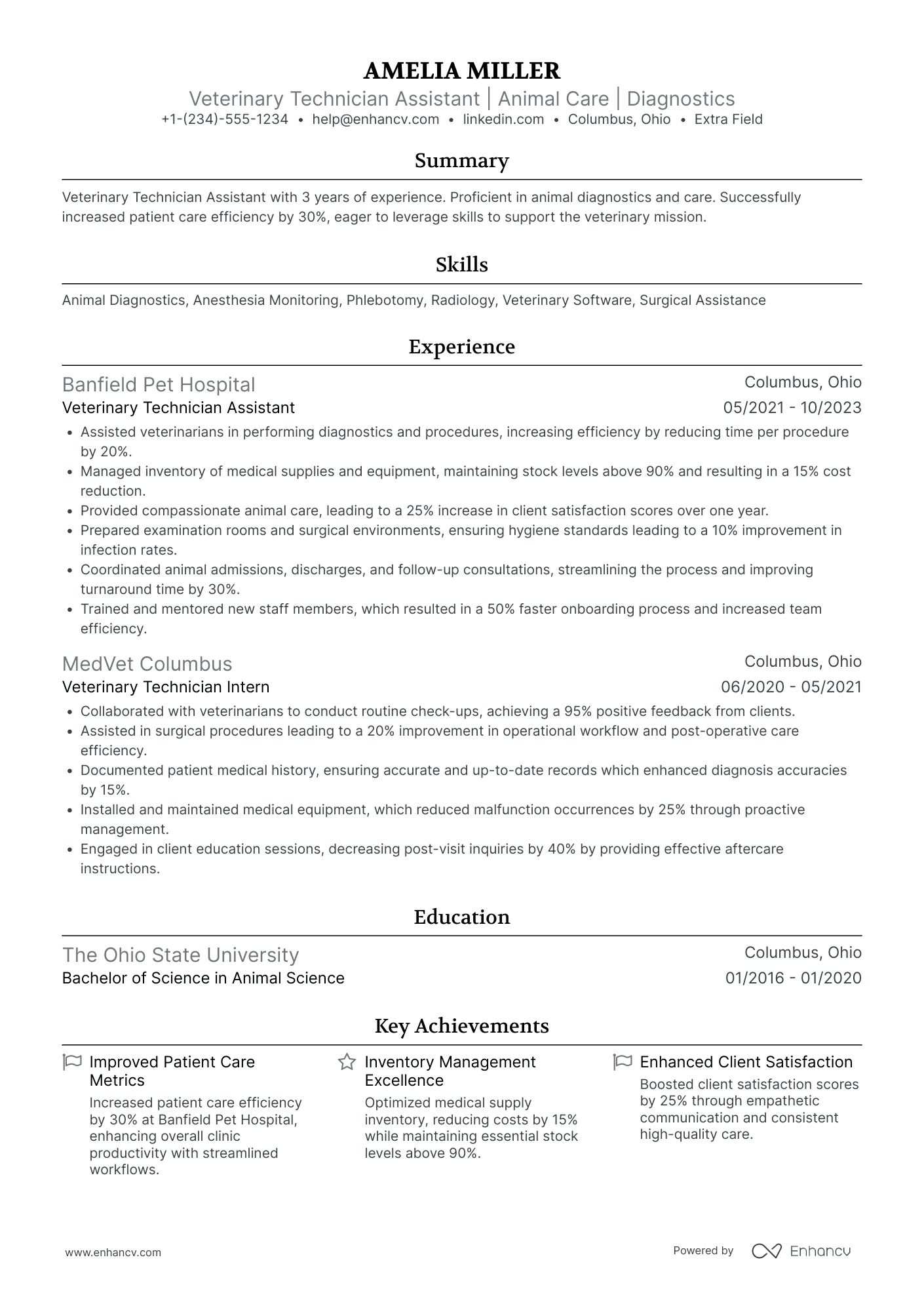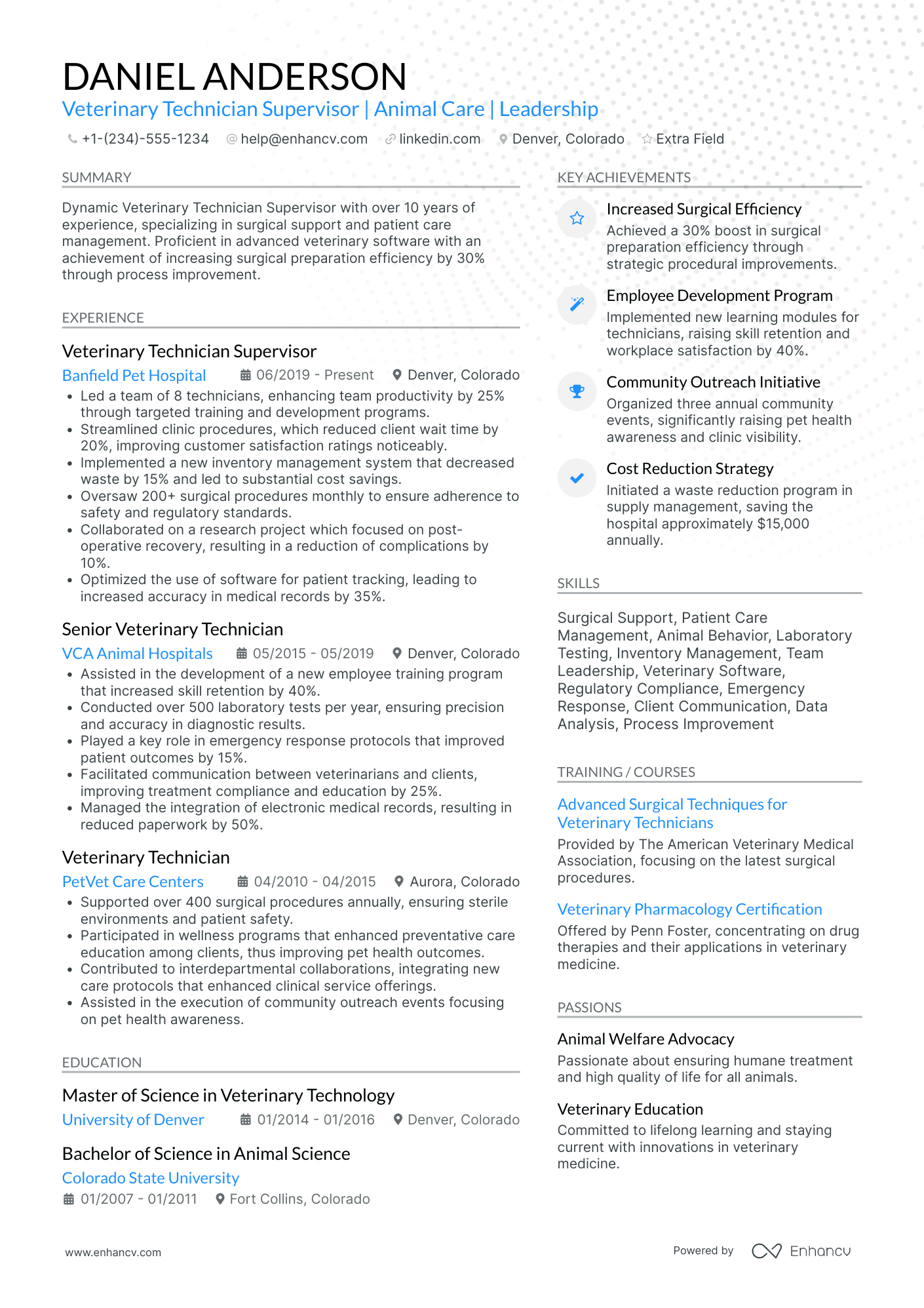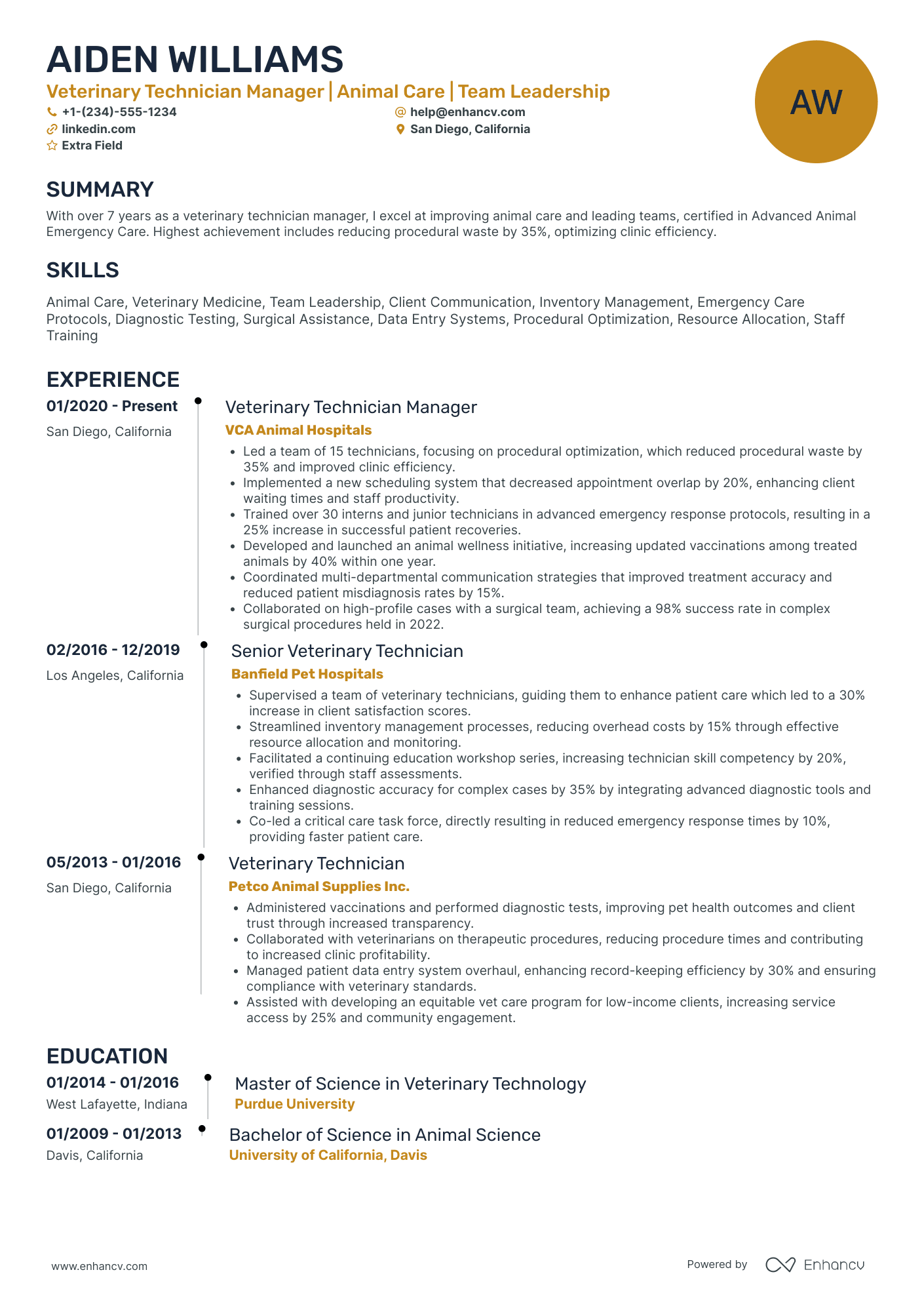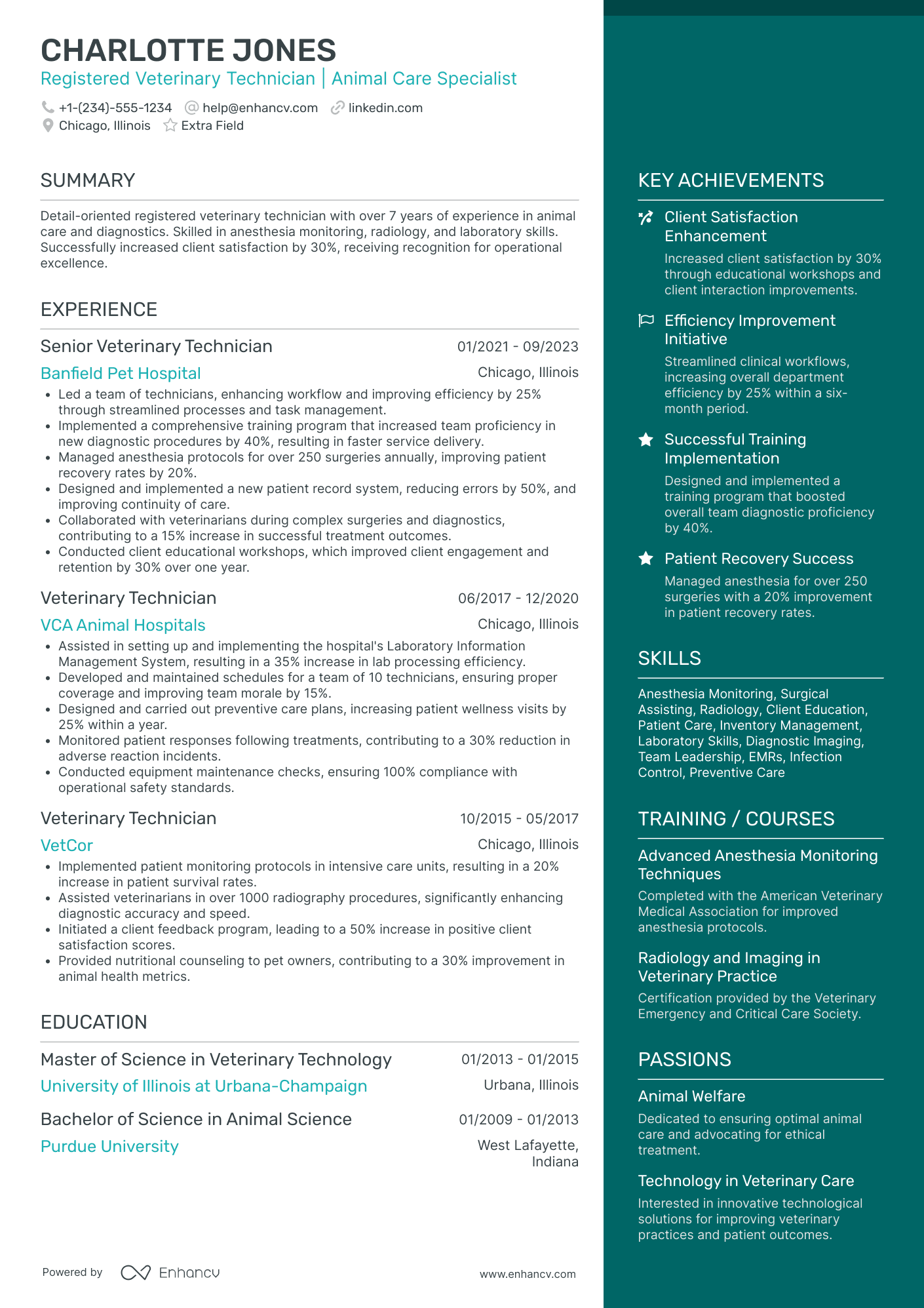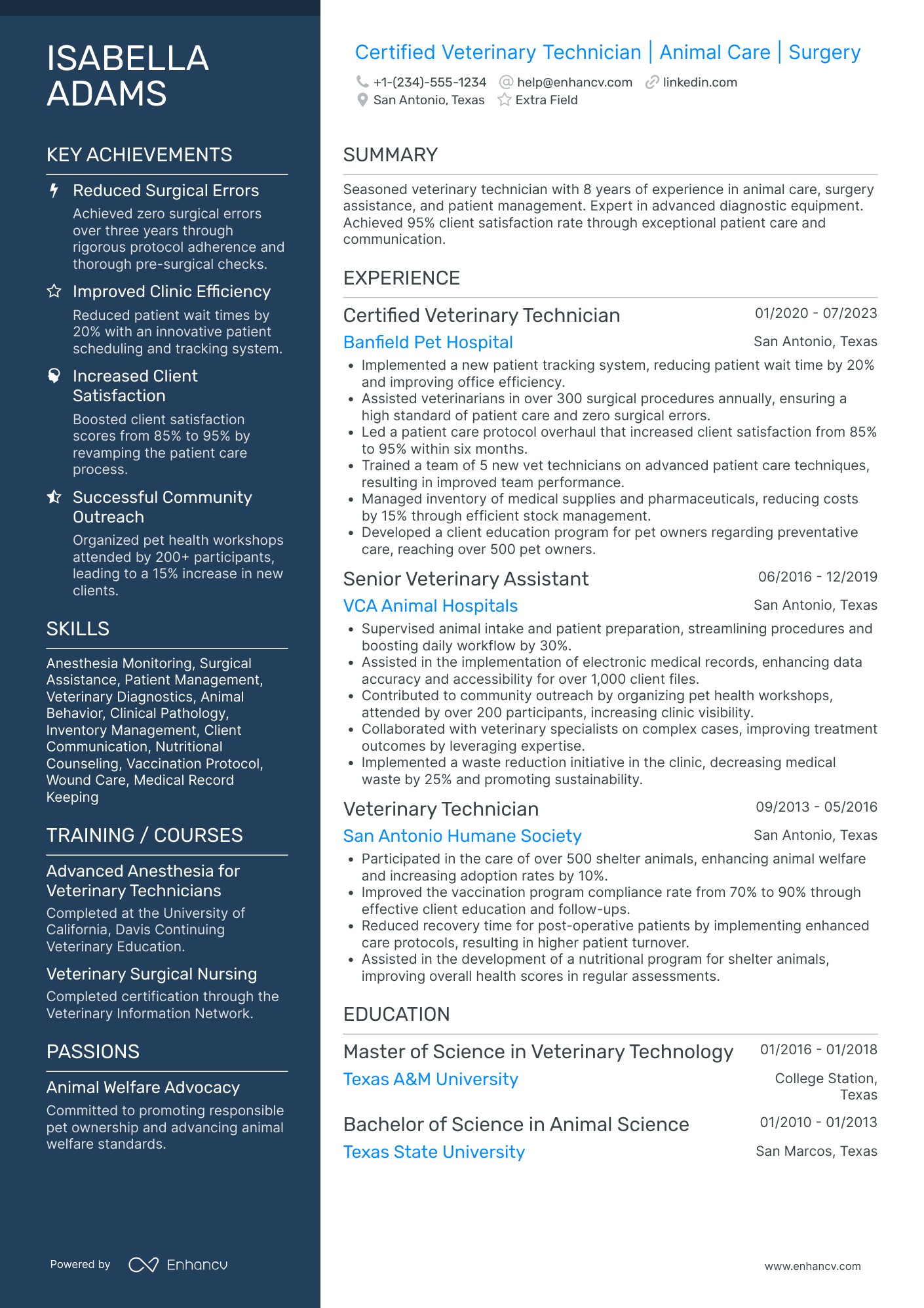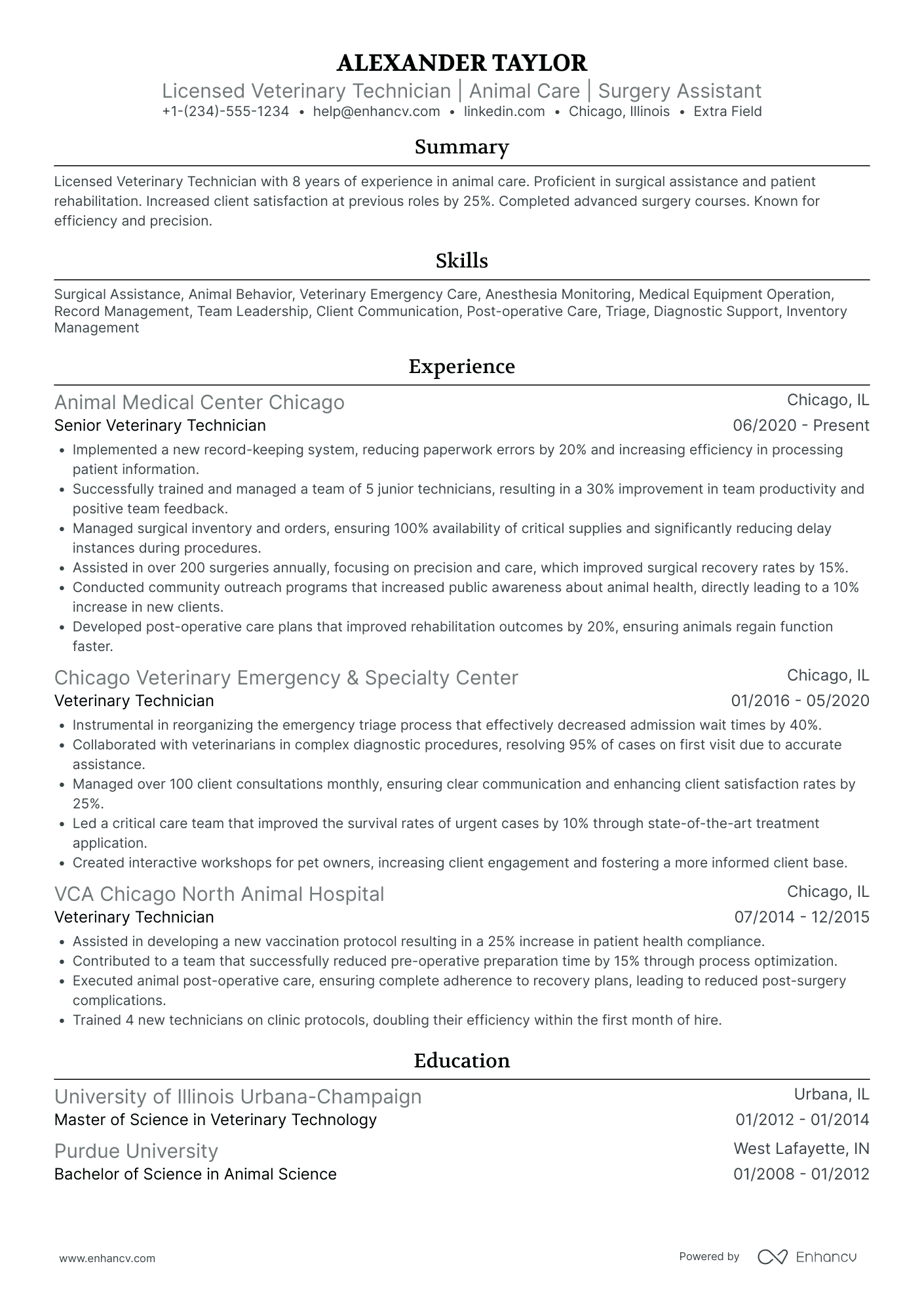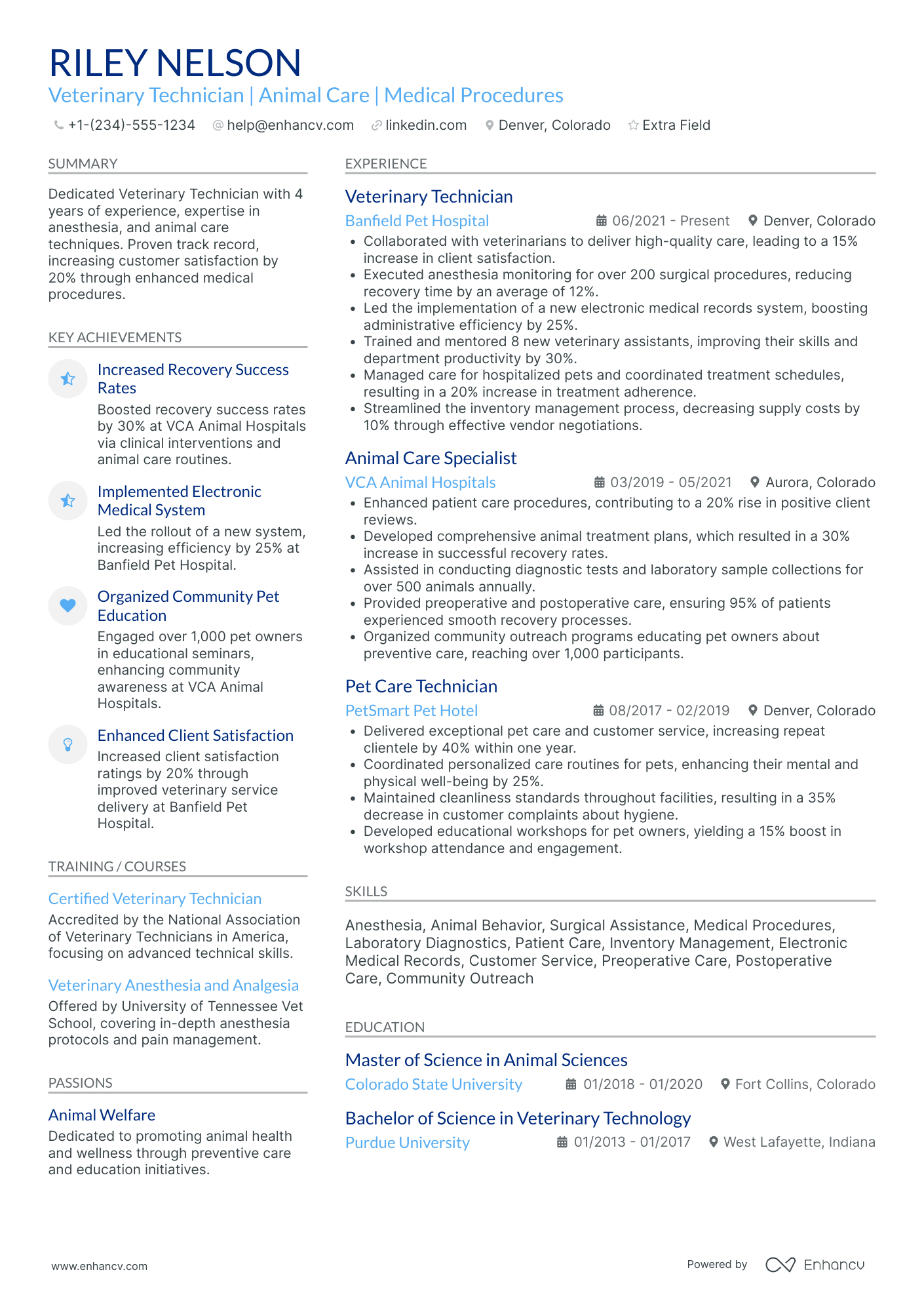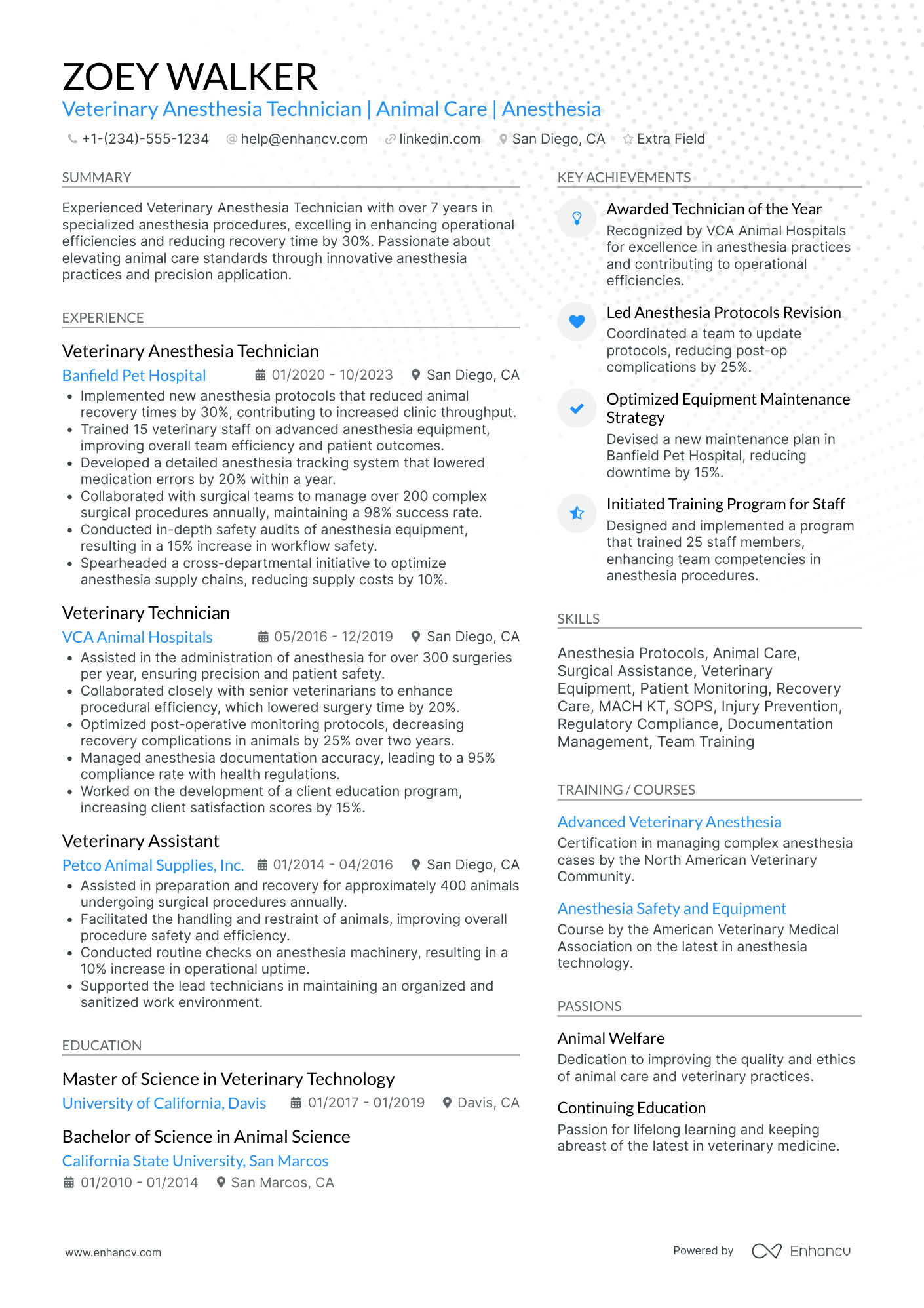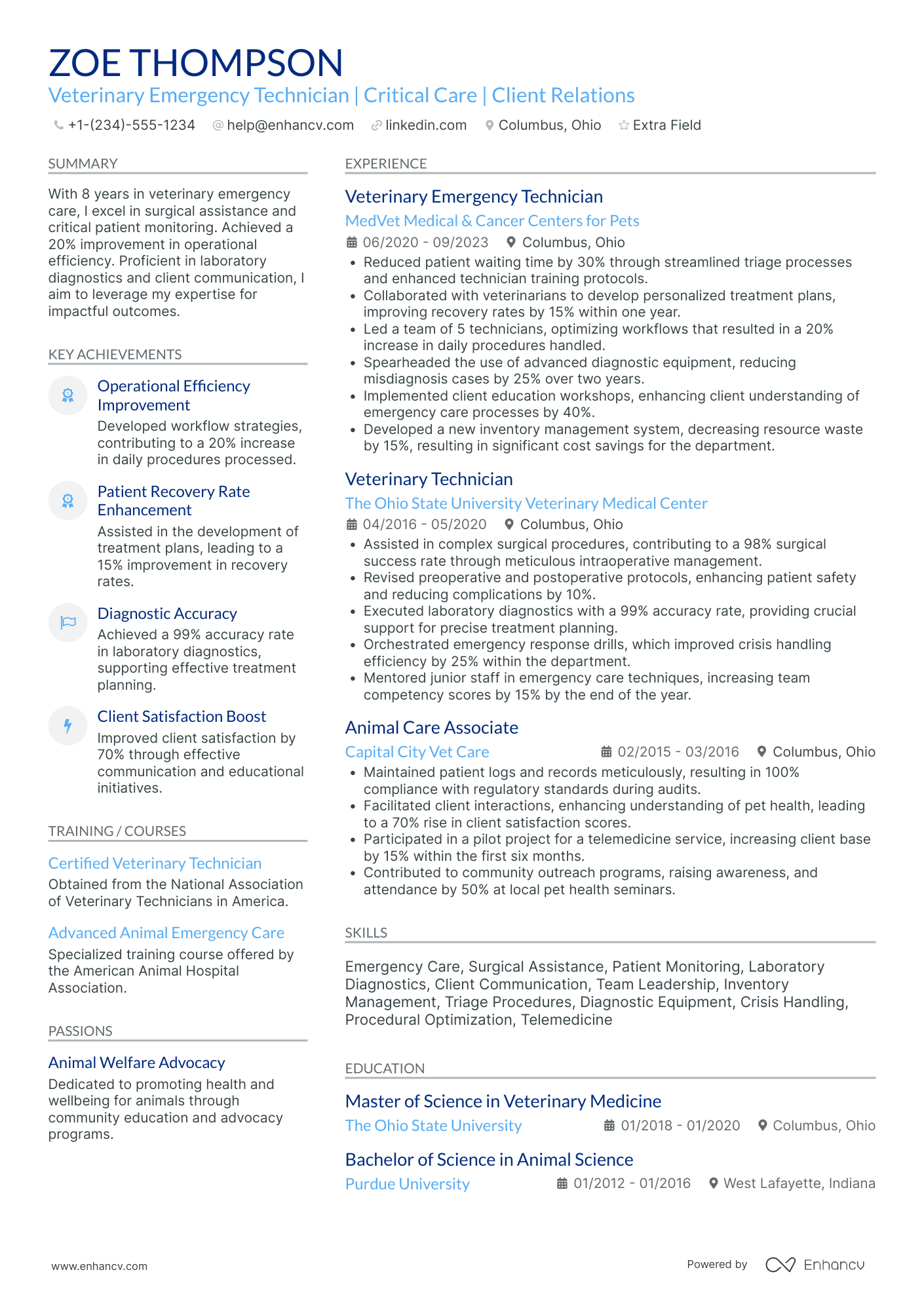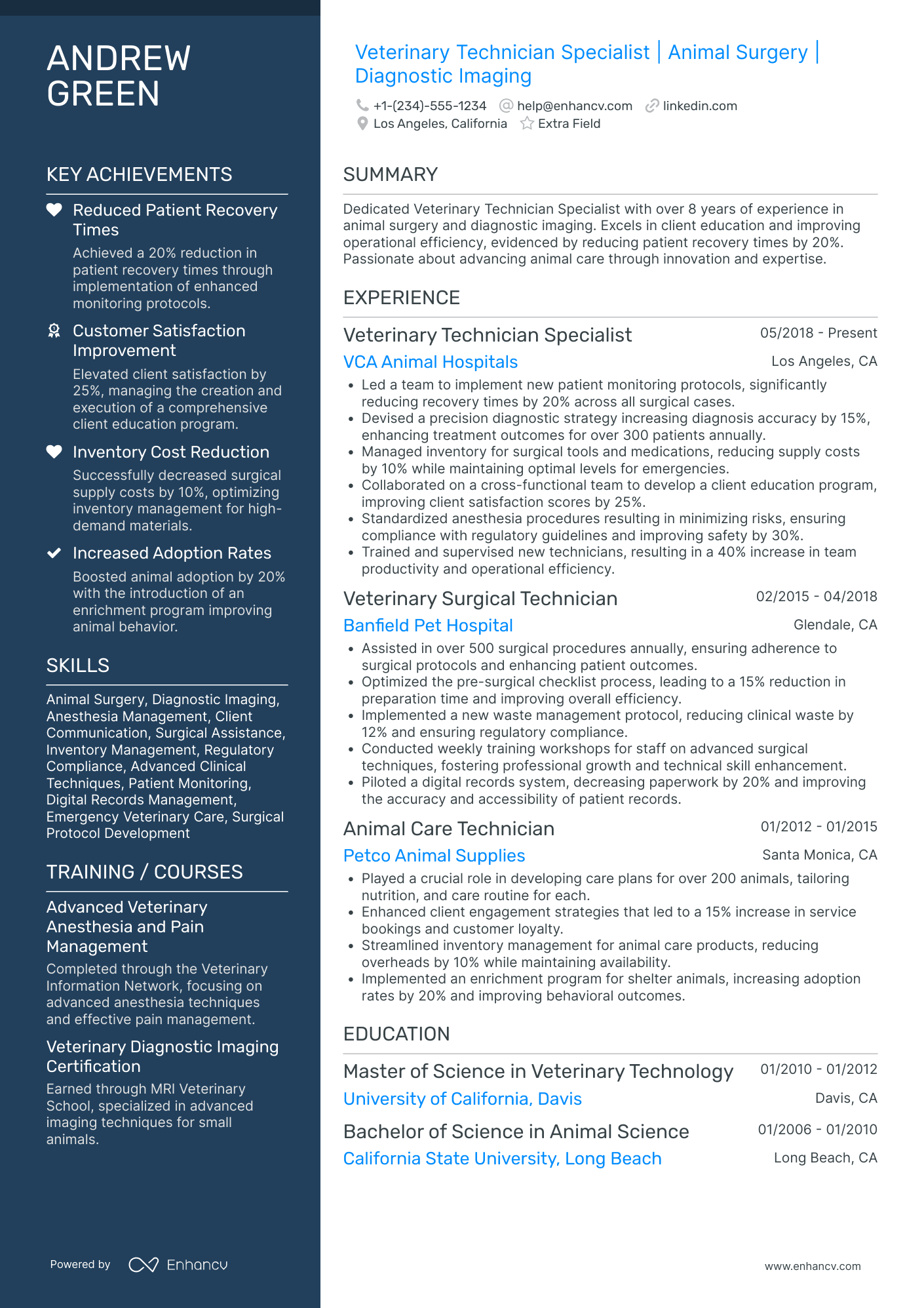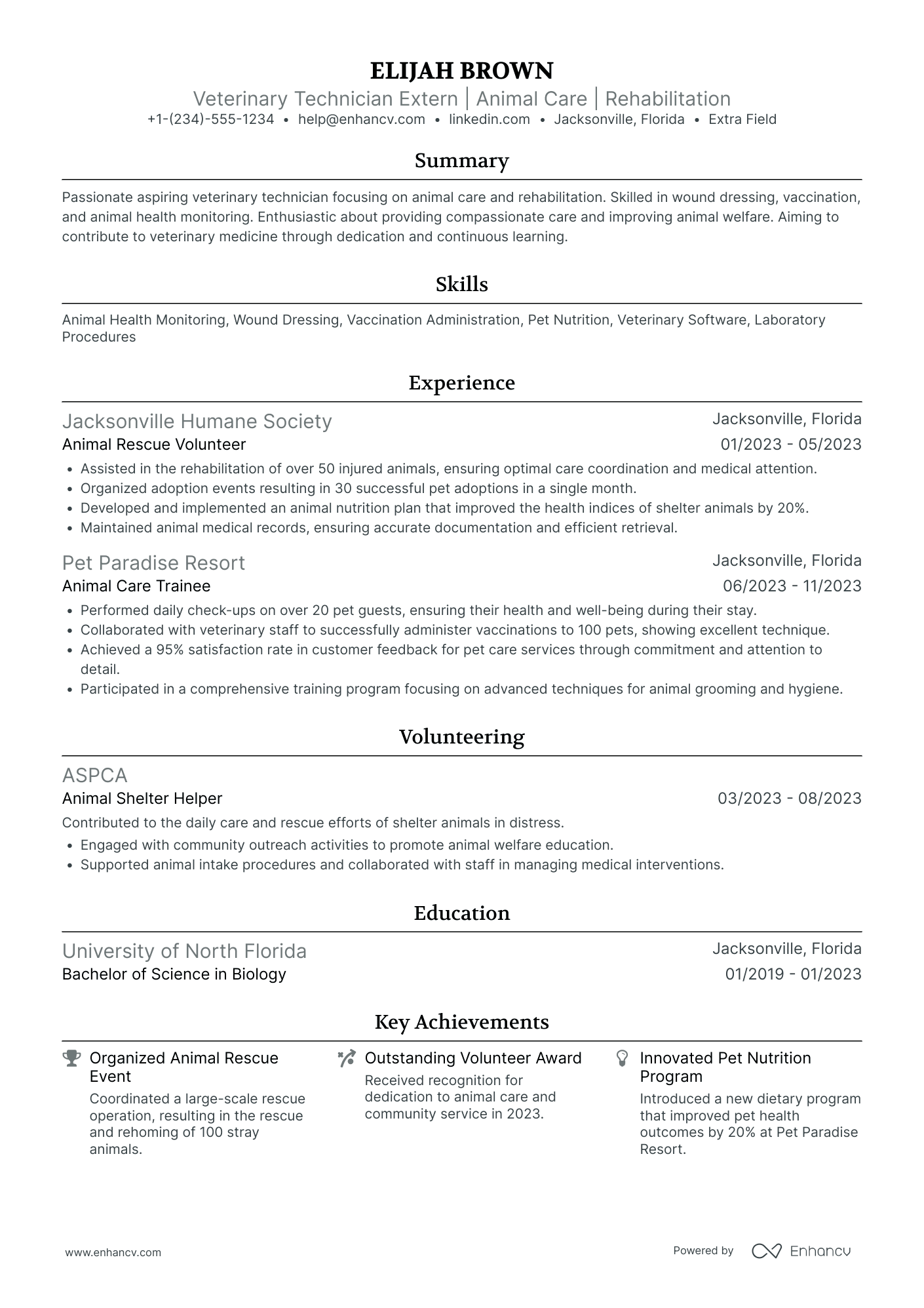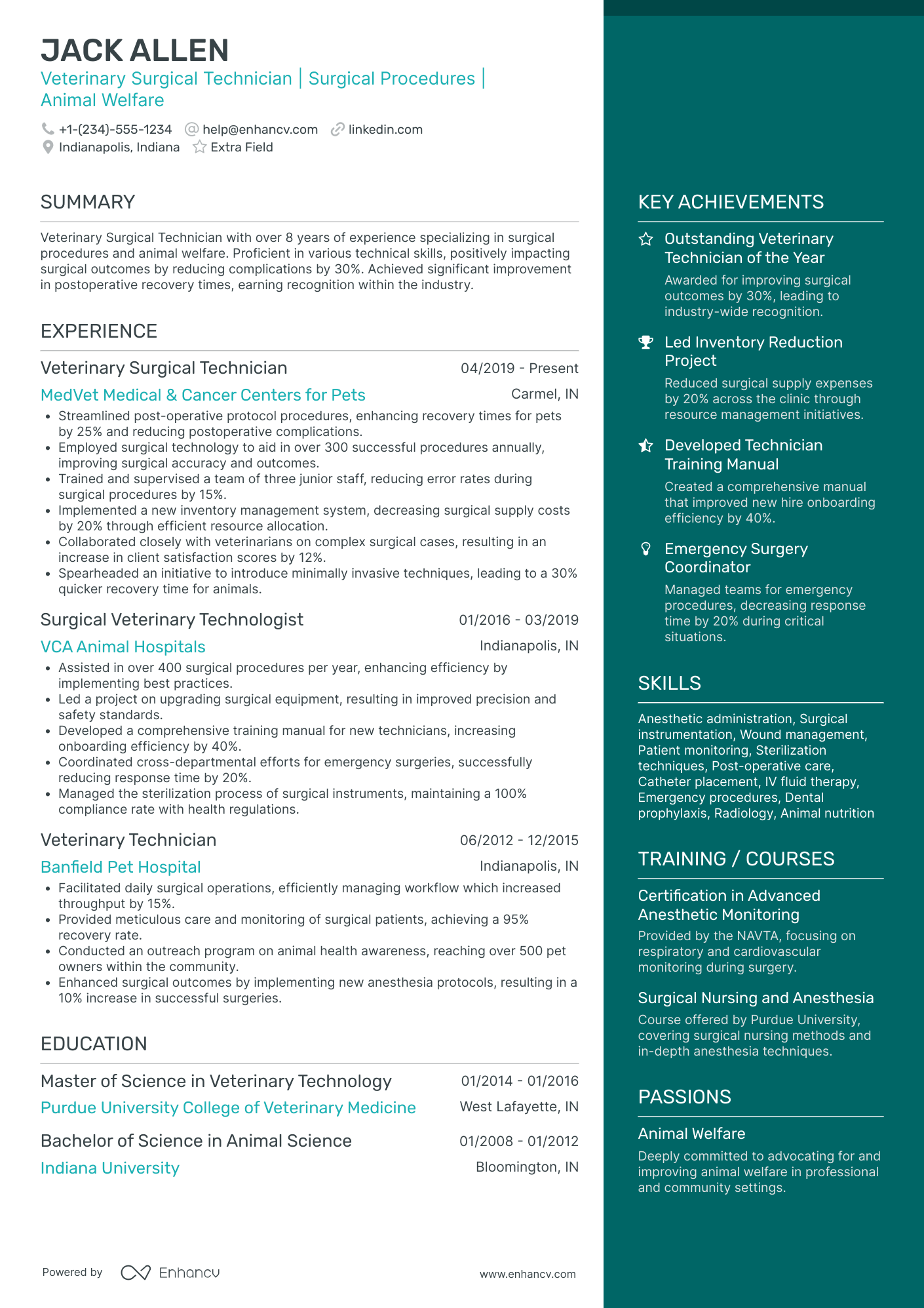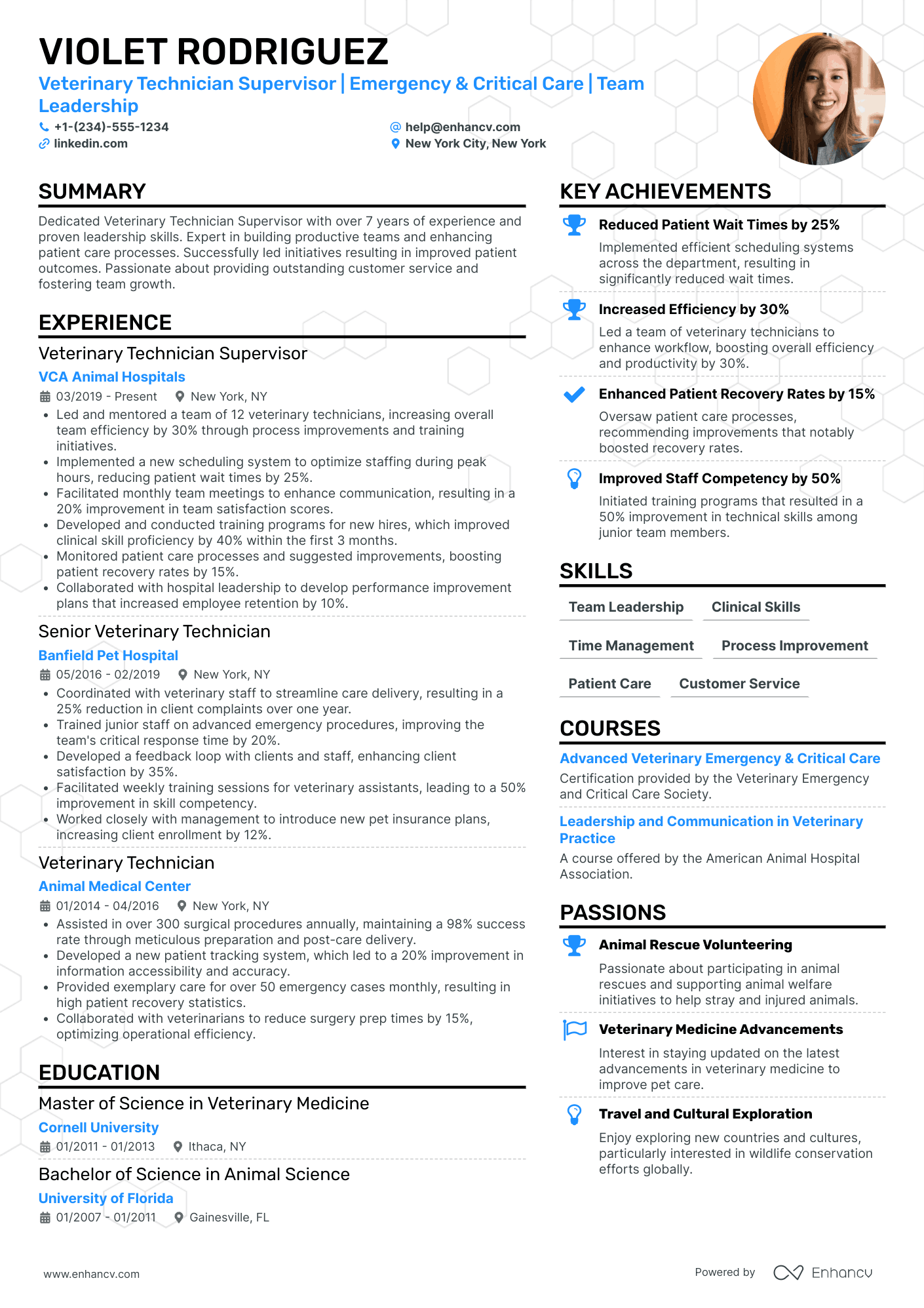As a veterinary technician, you might struggle to effectively showcase your extensive hands-on experience with a variety of animals and clinical tasks on your resume. Our guide provides tailored tips and examples to help you highlight your unique skills and expertise, ensuring your resume stands out to potential employers.
- Find different veterinary technician resume examples to serve as inspiration to your professional presentation.
- How to use the summary or objective to highlight your career achievements.
- How to create the experience section to tell your story.
- Must have certificates and what to include in the education section of your resume.
If the veterinary technician resume isn't the right one for you, take a look at other related guides we have:
How to style your veterinary technician resume: layout and format
When creating your veterinary technician resume, have you ever wondered how long it should be? Experts point out that it should be between one and two pages. Choose the longer format, if you happen to have over a decade of relevant experience. What is more, resume formats play a crucial role in presenting your experience. Use the:- Reverse-chronological resume format to highlight your experience;
- Functional skill-based resume format if you have less experience and want to focus on skills;
- Hybrid resume format to guide recruiters through both your experience and skills.
- Make sure your headline is simple and includes the job you're applying for or your current role, an abbreviation of a certificate you have, or even your professional area of interest;
- Always tailor your veterinary technician resume to the role you're applying for by matching job requirements to your experience via different resume sections;
- Once you've created your resume, download it in PDF (unless otherwise specified). This is to ensure readability and that the layout remains fixed.
Different markets have specific resume styles – a Canadian resume, for instance, may require a different approach.
Upload & Check Your Resume
Drop your resume here or choose a file. PDF & DOCX only. Max 2MB file size.
PRO TIP
List all your relevant higher education degrees within your resume in reverse chronological order (starting with the latest). There are cases when your PhD in a particular field could help you stand apart from other candidates.
The six in-demand sections for your veterinary technician resume:
- Top one-third should be filled with a header, listing your contact details, and with a summary or objective, briefly highlighting your professional accolades
- Experience section, detailing how particular jobs have helped your professional growth
- Notable achievements that tie in your hard or soft skills with tangible outcomes
- Popular industry certificates to further highlight your technical knowledge or people capabilities
- Education to showcase your academic background in the field
What recruiters want to see on your resume:
- Clinical skills, such as phlebotomy, radiology, anesthesia monitoring, and dental prophylaxis
- Experience with various veterinary software and medical records management
- Knowledge of animal behavior and restraint techniques for a variety of species
- Understanding of pharmacology, including drug administration and inventory management
- Certification as a veterinary technician (CVT, RVT, LVT) or relevant licensure specifics to the region of practice
Defining your professional expertise in your veterinary technician resume work experience section
The work experience section, often the most detailed part of your resume, is where you discuss your past roles and achievements. To effectively list your experience, consider these four key tips:
- Align your expertise with the job requirements. It's vital to integrate keywords matching the job criteria to pass initial assessments;
- Show, don’t just tell. Quantify your responsibilities by stating your actual achievements in previous roles;
- Include measurable metrics. For instance, how did your performance impact the annual ROI?
- Highlight crucial industry skills. Mention both technological knowledge and interpersonal skills in this section.
These guidelines will help you craft an impressive veterinary technician resume work experience section that is bound to catch recruiters' attention.
- Delivered routine care for pets, administering vaccinations and performing 50+ wellness checks per month to ensure pet health.
- Assisted in 100+ surgical procedures by preparing animals, maintaining sterile environments, and providing post-operative care, ensuring high survival rates.
- Conducted advanced diagnostic procedures using ultrasound and digital radiography, enhancing the detection of illnesses for early intervention.
- Implemented a new patient monitoring system that increased the accuracy of health tracking, improving patient outcomes significantly.
- Trained 15+ new veterinary technicians, thereby optimizing clinic workflow and enhancing team capability.
- Coordinated with veterinarians to facilitate emergency care treatment to 300+ animals, maximizing recovery success rates.
- Oversaw the laboratory analysis of 50+ weekly samples, providing critical data for accurate diagnoses and appropriate treatment plans.
- Pioneered an initiative to enhance pet-owner education on preventive care, leading to a 20% decrease in recurrent health issues among the clinic's pet patients.
- Managed inventory and ordering of medical supplies, cutting costs by 10% while ensuring the clinic was well-equipped at all times.
- Introduced a pain management protocol that improved patient comfort for 200+ post-operative animals annually.
- Facilitated communication between the veterinary team and pet owners, increasing satisfaction scores by 30%.
- Managed the treatment schedules for chronic care patients, boosting the on-time treatment rate to 95%.
- Operated advanced diagnostic equipment, including MRI and CT machines, aiding in 500+ accurate diagnoses of complex conditions.
- Developed a streamlined process for anesthesia monitoring that improved procedure safety for all surgeries.
- Collaborated with a team to implement telemedicine consultations that expanded service reach to remote clients by 40%.
- Assisted in the successful rehabilitation of 100+ wildlife cases by providing appropriate care and ensuring their release back to natural habitats.
- Developed relationships with local rescue organizations to place 50+ animals in permanent homes, advocating for the welfare of abandoned pets.
- Created comprehensive patient records that enhanced the quality of care through better historical health tracking.
- Integrated a dental health program that increased dental procedure frequency by 25%, contributing to overall pet oral hygiene.
- Performed over 600 spay and neuter surgeries, playing a pivotal role in local animal population control initiatives.
- Managed a cross-functional project to improve clinic sanitation, resulting in a 99.9% elimination of cross-contamination incidents.
- Designed a nutritional counseling program that personalized diet plans for clients, leading to better health outcomes in 500+ pets.
- Leveraged data to optimize vaccine inventory, reducing waste by 40% while maintaining a 100% vaccination completion rate.
- Streamlined the electronic medical record-keeping process, ensuring all 1,200 patient files were up-to-date and easily accessible.
Quantifying impact on your resume
- Report the number of patients you manage or assist with on a daily basis to demonstrate your ability to handle a high volume of work efficiently.
- Quantify the amount of surgical assistance you've provided to showcase your hands-on experience with various procedures.
- Highlight any improvements in patient recovery times due to your direct care to emphasize your positive impact on animal health outcomes.
- Include the percentage increase of client retention or satisfaction scores to exhibit your contribution to client relationship management.
- Document the number of staff you've trained or mentored to illustrate your leadership skills and your role in team development.
- Specify the number of diagnostic tests you perform regularly to give insight into your technical skills and precision.
- State the reduction in inventory costs achieved through your inventory management to display your cost-saving initiatives.
- Mention the volume of medical records you manage or update to highlight your organizational skills and attention to detail.
Action verbs for your veterinary technician resume
No experience, no problem: writing your veterinary technician resume
You're quite set on the veterinary technician role of your dreams and think your application may add further value to your potential employers. Yet, you have no work experience . Here's how you can curate your resume to substitute your lack of experience:
- Don't list every single role you've had so far, but focus on ones that would align with the job you're applying for
- Include any valid experience in the field - whether it's at research or intern level
- Highlight the soft skills you'd bring about - those personality traits that have an added value to your application
- Focus on your education and certifications, if they make sense for the role.
Recommended reads:
PRO TIP
If the certificate you've obtained is especially vital for the industry or company, include it as part of your name within the resume headline.
Defining your unique veterinary technician skill set with hard skills and soft skills
In any job advertisement, a blend of specific technologies and interpersonal communication skills is typically sought after. Hard skills represent your technical expertise and indicate your job performance capacity. Soft skills, on the other hand, demonstrate how well you would integrate within the company culture.
Incorporating a balanced mix of both skill types in your veterinary technician resume is crucial. Here's how you can do it:
- In your resume summary or objective, incorporate up to three hard and/or soft skills. Make sure to quantify these skills with relevant or impressive achievements; less
- The skills section should list your technical know-how.
- The strengths section is an ideal place to quantify your competencies by focusing on the achievements facilitated by these skills.
Top skills for your veterinary technician resume:
Veterinary medical equipment operation
Anesthesia administration
Radiography (X-ray) techniques
Laboratory diagnostics
Pharmaceutical dispensing
Surgical assistance
Dental prophylaxis and care
Medical record management software
Ultrasound technology
Infection control protocols
Communication skills
Empathy and compassion
Attention to detail
Teamwork and collaboration
Problem-solving skills
Time management
Stress management
Adaptability
Customer service orientation
Critical thinking
PRO TIP
Highlight any significant extracurricular activities that demonstrate valuable skills or leadership.
Listing your education and certifications on your veterinary technician resume
Don't underestimate the importance of your resume education section . As it may hint at various skills (and experience) that are relevant to the job. When writing your education section:
- Include only higher education degrees with information about the institution and start/end dates
- If you're in the process of obtaining your degree, include your expected graduation date
- Consider leaving off degrees that aren't relevant to the job or industry
- Write a description of your education if it presents you with an opportunity to further showcase your achievements in a more research-focused environment
When describing your certifications on your resume, always consider their relevancy to the role. Use the same format to describe them as you would for your education. If you're wondering what the best certificates out there are for veterinary technician roles, check out the list below.
The top 5 certifications for your veterinary technician resume:
- Certified veterinary technician (CVT) - State veterinary technician Associations
- Registered veterinary technician (RVT) - State veterinary technician Associations
- Licensed veterinary technician (LVT) - State veterinary technician Associations
- Veterinary technician Specialist (VTS) - National Association of veterinary technicians in America (NAVTA)
- Approved Veterinary Assistant (AVA) - National Association of veterinary technicians in America (NAVTA)
PRO TIP
Bold the names of educational institutions and certifying bodies for emphasis.
Recommended reads:
Deciding between a resume summary or objective for your veterinary technician role
Understanding the distinction between a resume summary and an objective is crucial for your veterinary technician resume.
A resume summary, typically three to five sentences long, offers a concise overview of your career. This is the place to showcase your most pertinent experience, key accomplishments, and skills. It's particularly well-suited for those with professional experience relevant to the job requirements.
In contrast, a resume objective focuses on how you can add value to potential employers. It addresses why they should hire you and outlines your career expectations and learning goals. Therefore, it's ideal for candidates with less experience.
In the following section of our guide, explore how resume summaries and objectives differ through some exemplary industry-specific examples.
Resume summaries for a veterinary technician job
- With over 8 years of hands-on experience in veterinary clinics, a dedicated veterinary technician specialized in small animal care brings a proven track record of excellence in veterinary surgery assistance and laboratory diagnostics. Recognized for outstanding communication with pet owners and efficient management of animal healthcare records.
- Accomplished veterinary technician with 5 years of experience in a high-volume emergency animal hospital. Skilled in anesthesia administration, radiology, and intensive care unit management. Received commendation for facilitating a 20% increase in successful post-operative recoveries through the implementation of a revised post-surgery monitoring protocol.
- Dynamic healthcare professional pivoting to the veterinary technician field after 6 years as a Human Nurse. Holds a deep-rooted passion for animal welfare, reinforced by substantial volunteer work at local shelters. Eager to apply extensive knowledge of medicine administration, wound care, and patient monitoring to a new and fulfilling veterinary practice context.
- Enthusiastic marketer with a Master's degree in Marketing, seeking to leverage a passion for animal health as a veterinary technician. Brings extensive expertise in client communication and brand management, and a commendable volunteer background with endangered species conservation programs. Currently enrolled in a veterinary technician Certification program to enhance animal health competencies.
- Aspiring to begin a meaningful career as a veterinary technician, a recent biology graduate with extensive academic knowledge in animal physiology offers commitment to learn and excel in veterinary care. Eager to develop practical skills in diagnostics, surgical assistance, and compassionate client interactions within a forward-thinking veterinary team.
- Energetic and fresh to the veterinary science industry, possessing a strong foundation in animal care through personal pet ownership and a Bachelor's degree in Animal Science. Seeking to leverage academic experience and a genuine enthusiasm for animal well-being to deliver high-quality support as a developing veterinary technician.
Optimize your resume summary and objective for ATS
Drop your resume here or choose a file.
PDF & DOCX only. Max 2MB file size.
Extra sections to include in your veterinary technician resume
What should you do if you happen to have some space left on your resume, and want to highlight other aspects of your profile that you deem are relevant to the role? Add to your veterinary technician resume some of these personal and professional sections:
- Passions/Interests - to detail how you spend both your personal and professional time, invested in various hobbies;
- Awards - to present those niche accolades that make your experience unique;
- Publications - an excellent choice for professionals, who have just graduated from university or are used to a more academic setting;
- Volunteering - your footprint within your local (or national/international) community.
Key takeaways
- Pay special attention to the tiny details that make up your veterinary technician resume formatting: the more tailored your application to the role is, the better your chances at success would be;
- Select the sections you include (summary or objective, etc.) and formatting (reverse-chronological, hybrid, etc.) based on your experience level;
- Select experience items and, consequently, achievements that showcase you in the best light and are relevant to the job;
- Your profile will be assessed both based on your technical capabilities and personality skills - curate those through your resume;
- Certifications and education showcase your dedication to the particular industry.
Veterinary Technician resume examples
By Experience
Senior Veterinary Technician
Lead Veterinary Technician
Veterinary Technician Assistant
By Role
Veterinary Technician Supervisor
Veterinary Technician Manager
Registered Veterinary Technician
Certified Veterinary Technician
Licensed Veterinary Technician
Veterinary Technician Intern
Veterinary Anesthesia Technician
Veterinary Emergency Technician
Veterinary Technician Specialist
Veterinary Technician Extern
Veterinary Surgical Technician
Veterinary Technician Coordinator
- Organized and Concise Presentation - The resume is structured with clear sections that provide easy navigation through Violet’s professional journey. Each section is crisp, utilizing succinct bullet points to present essential information without overwhelming the reader.
- Career Growth and Advancement - The progression from Veterinary Technician to Supervisor illustrates a clear career trajectory marked by increasing responsibilities. Violet's leadership roles in prominent veterinary hospitals highlight her advancement and commitment to the veterinary field.
- Strategic Achievements with Business Impact - The resume effectively quantifies achievements like reducing patient wait times by 25% and improving team efficiency by 30%. These metrics are not just numbers; they demonstrate Violet's strategic capabilities in improving operational processes and enhancing patient care outcomes.
